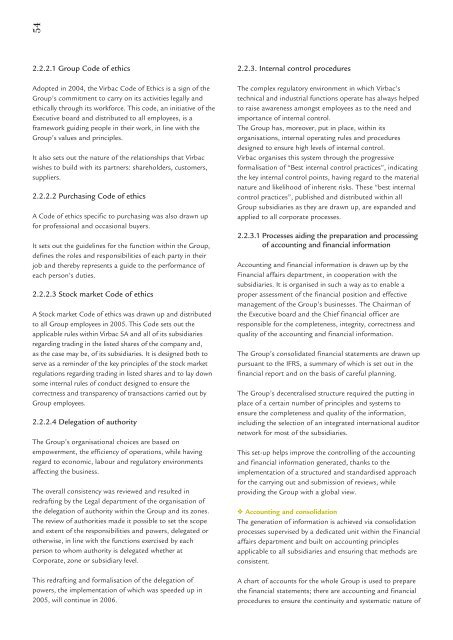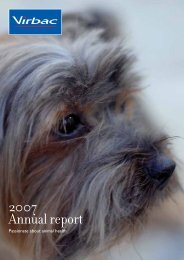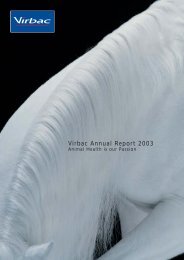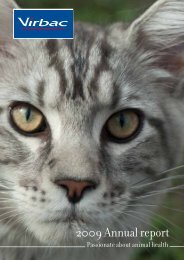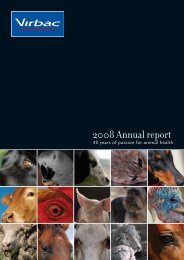2005 Annual report - Virbac
2005 Annual report - Virbac
2005 Annual report - Virbac
Create successful ePaper yourself
Turn your PDF publications into a flip-book with our unique Google optimized e-Paper software.
54<br />
2.2.2.1 Group Code of ethics<br />
Adopted in 2004, the <strong>Virbac</strong> Code of Ethics is a sign of the<br />
Group’s commitment to carry on its activities legally and<br />
ethically through its workforce. This code, an initiative of the<br />
Executive board and distributed to all employees, is a<br />
framework guiding people in their work, in line with the<br />
Group’s values and principles.<br />
It also sets out the nature of the relationships that <strong>Virbac</strong><br />
wishes to build with its partners: shareholders, customers,<br />
suppliers.<br />
2.2.2.2 Purchasing Code of ethics<br />
A Code of ethics specific to purchasing was also drawn up<br />
for professional and occasional buyers.<br />
It sets out the guidelines for the function within the Group,<br />
defines the roles and responsibilities of each party in their<br />
job and thereby represents a guide to the performance of<br />
each person’s duties.<br />
2.2.2.3 Stock market Code of ethics<br />
A Stock market Code of ethics was drawn up and distributed<br />
to all Group employees in <strong>2005</strong>. This Code sets out the<br />
applicable rules within <strong>Virbac</strong> SA and all of its subsidiaries<br />
regarding trading in the listed shares of the company and,<br />
as the case may be, of its subsidiaries. It is designed both to<br />
serve as a reminder of the key principles of the stock market<br />
regulations regarding trading in listed shares and to lay down<br />
some internal rules of conduct designed to ensure the<br />
correctness and transparency of transactions carried out by<br />
Group employees.<br />
2.2.2.4 Delegation of authority<br />
The Group’s organisational choices are based on<br />
empowerment, the efficiency of operations, while having<br />
regard to economic, labour and regulatory environments<br />
affecting the business.<br />
The overall consistency was reviewed and resulted in<br />
redrafting by the Legal department of the organisation of<br />
the delegation of authority within the Group and its zones.<br />
The review of authorities made it possible to set the scope<br />
and extent of the responsibilities and powers, delegated or<br />
otherwise, in line with the functions exercised by each<br />
person to whom authority is delegated whether at<br />
Corporate, zone or subsidiary level.<br />
This redrafting and formalisation of the delegation of<br />
powers, the implementation of which was speeded up in<br />
<strong>2005</strong>, will continue in 2006.<br />
2.2.3. Internal control procedures<br />
The complex regulatory environment in which <strong>Virbac</strong>’s<br />
technical and industrial functions operate has always helped<br />
to raise awareness amongst employees as to the need and<br />
importance of internal control.<br />
The Group has, moreover, put in place, within its<br />
organisations, internal operating rules and procedures<br />
designed to ensure high levels of internal control.<br />
<strong>Virbac</strong> organises this system through the progressive<br />
formalisation of “Best internal control practices”, indicating<br />
the key internal control points, having regard to the material<br />
nature and likelihood of inherent risks. These “best internal<br />
control practices”, published and distributed within all<br />
Group subsidiaries as they are drawn up, are expanded and<br />
applied to all corporate processes.<br />
2.2.3.1 Processes aiding the preparation and processing<br />
of accounting and financial information<br />
Accounting and financial information is drawn up by the<br />
Financial affairs department, in cooperation with the<br />
subsidiaries. It is organised in such a way as to enable a<br />
proper assessment of the financial position and effective<br />
management of the Group’s businesses. The Chairman of<br />
the Executive board and the Chief financial officer are<br />
responsible for the completeness, integrity, correctness and<br />
quality of the accounting and financial information.<br />
The Group’s consolidated financial statements are drawn up<br />
pursuant to the IFRS, a summary of which is set out in the<br />
financial <strong>report</strong> and on the basis of careful planning.<br />
The Group’s decentralised structure required the putting in<br />
place of a certain number of principles and systems to<br />
ensure the completeness and quality of the information,<br />
including the selection of an integrated international auditor<br />
network for most of the subsidiaries.<br />
This set-up helps improve the controlling of the accounting<br />
and financial information generated, thanks to the<br />
implementation of a structured and standardised approach<br />
for the carrying out and submission of reviews, while<br />
providing the Group with a global view.<br />
❖ Accounting and consolidation<br />
The generation of information is achieved via consolidation<br />
processes supervised by a dedicated unit within the Financial<br />
affairs department and built on accounting principles<br />
applicable to all subsidiaries and ensuring that methods are<br />
consistent.<br />
A chart of accounts for the whole Group is used to prepare<br />
the financial statements; there are accounting and financial<br />
procedures to ensure the continuity and systematic nature of


